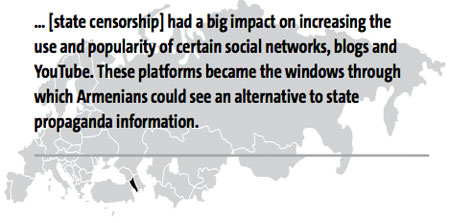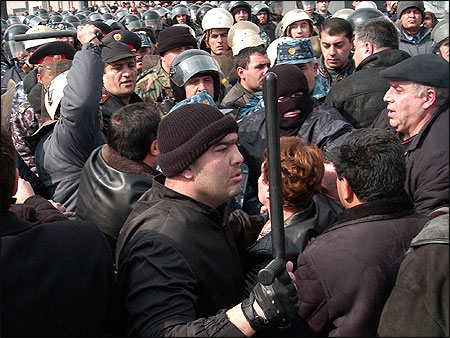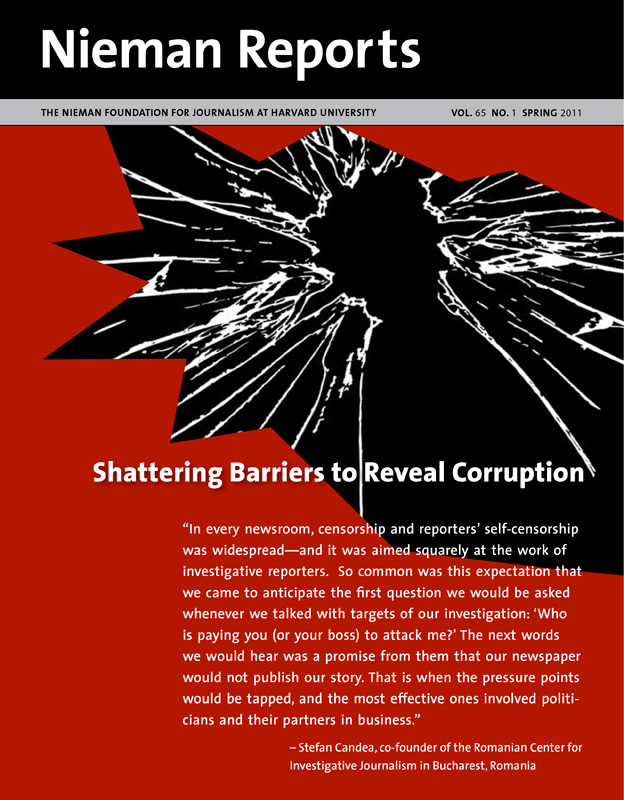… We need your honest and unbiased approach so that Armenian society, the entire state structure, different bodies and individuals see in the mirror of mass media their own genuine picture. It is crucial that the mirror is not fuzzy and the picture is not distorted.—Armenian President Serzh Sargsyan on December 28, 2010
President Sargsyan was speaking at a reception to representatives of media outlets, most of whom are loyal to the Armenian government. In hearing his words—and contrasting them to his actions—can Armenians trust that the authorities are ready to allow the nation's news media, most of all television news, to become an unbiased and truthful mirror of their regime? Can such presidential statements—made to friendly audiences—about the necessity of fair media be regarded as a change of the policy that is leading to liberalization of the sphere?
The sincerity of such statements merits close attention this year, with parliamentary and presidential elections looming in 2012 and 2013, respectively. Already the president's words stand in contrast to changes made recently in the tightly controlled broadcast media sphere during the transition to digital broadcasting. Instead of using this opportunity to diversify the news media, the government tightened its grip.
RELATED LINK
Resources for Investigative ReportersWhen I was a child in Armenia during Soviet times, I would stand before a mirror and act as the host of my own talk show. Back then the government acted as the queen did in Snow White, one of my favorite fairy tales. Each morning the queen asked, "Mirror, mirror on the wall, who's the fairest one of all?" And the mirror would answer, "You, my queen, are fairest of all." Then Snow White grew up to be a beautiful woman, and the mirror gave the queen a different answer: "Queen, you are full fair, 'tis true, but Snow White is fairer than you." The queen broke the mirror when it told her the truth.
Silencing a TV Channel
On April 2, 2002, the government of Armenia, which has been an independent country since 1991, banned A1+, one of the first of Armenia's independent TV channels, from broadcasting. This decision was made with clear political motives. I had worked at this TV channel for more than six years. This channel stands as a symbol of Armenia's "broken mirror." By shutting it down, authorities revealed their fear of the power of TV—the country's dominant news medium—if it moves out of their control.

At 9:45 p.m. on that day, I was the host of the channel's main news program. I knew this was going to be my last appearance on A1+ so I closed the newscast with these words: "Soon, we will be off the air. Our team is saying goodbye to you with the confidence and hope of being back on air again, sometime soon." Three hours later our broadcast transmitter was turned off on the order of the National Commission on Television and Radio (NCTR). A popular and independent voice of Armenia was shut down.
After being on the air for six and a half years and gaining vast popularity among the people, A1+ lost its broadcasting license in a deal organized by the government-controlled commission whose members had been appointed by Armenia's president. Despite the attempts of various international organizations to help it return to the air and a European court ruling in favor of that happening, A1+ has been denied a broadcasting license ever since that day.
On June 17, 2008, the Strasbourg-based European Court of Human Rights found Armenian authorities at fault for repeatedly denying a broadcasting license to A1+. (Armenia became a member of the Council of Europe (COE) in January 2001 and thus accepted the principles of the rule of law and the jurisdiction of human rights and fundamental freedoms for its citizens.) This ruling spoke of the license denials as violations of Article 10 of the European Convention on Human Rights.
It was not the first ruling this court made against Armenia, but it was the first time that the court's ruling referred to freedom of speech. Here is a portion of the statement about the ruling issued by Terry Davis, who is the secretary general of the COE:
The decision of the Court is a victory for freedom of expression. It should also serve as a lesson to all governments inclined to arbitrary interpretations of Article 10 of the European Convention on Human Rights, which guarantees this essential freedom.
Since 2002, press freedom in Armenia has received bad marks in reports issued by Freedom House, a watchdog organization based in the U.S.; after the closing of A1+, Armenia has been ranked among those countries that are "not free." Here are words from its 2003 report—and this sentiment has held since then:
Freedom of the press declined in Armenia as a result of the closing of the country's leading independent television station, and the government's continued attempts to stifle criticism in the media.
Many international observers believe that A1+'s closing represented a crucial change in the environment in which the news media operate there. In Armenia, the shutdown of A1+ was a valuable lesson to all nonstate-run TV companies in showing what happens to a company that acts in ways considered to be unloyal to the government. The 2010 Freedom House report referenced this situation when it said that "many of the private television stations are owned by government-friendly business elites, and broadcasters engage in a high degree of self-censorship to avoid having their licenses revoked." Issues revolving around freedom of speech and media censorship in Armenia are mentioned in many of the reports by international watchdog organizations and by various high-ranking American and European officials.
Yet, during times of crisis in Armenia, the government-friendly faces of the TV companies are predominant. In the 2008 presidential election, for example, most TV channels refused to run paid political advertisements thus depriving the opposition of access to a wide audience, according to reports published in print and online media. An analysis of the election by Freedom House cited reports by election monitoring organizations in the region. These revealed that "the coverage of [opposition candidate Levon] Ter-Petrossian's campaign by the main broadcast media was selective, distorted, and mostly negative in tone," and that for the first four months of the campaign, "coverage was grossly biased in factor of [President] Serzh Sargsyan in terms of both airtime distribution and tone, giving him an unfair advantage over the other candidates."
It is clear that Armenians received biased and censored TV coverage before the election. After the president was re-elected, tens of thousands of Ter-Petrossian supporters protested the result, which they claimed had been falsified. Unfair coverage before and after the election, held on February 19, 2008, added to the public's distrust of authorities, and these feelings intensified following the events of March 1, when 10 people died and more than 200 were injured as protests were met with government force.

State of Emergency
For nearly three weeks the government imposed a state of emergency that placed even harsher limitations on media outlets. The decree stated that "mass media will publish information given only by state establishments."
Most newspapers suspended their work as a result of the censorship being imposed. On the order of security officials, Internet service providers blocked the websites of A1+ (which has a digital presence even though it doesn't have a broadcast channel), Haykakan Zhamanak ("Armenian Time"), and Aravot ("Morning"). Radio Liberty's Armenian language broadcasting was taken off the air and its website was blocked.
Of course, these actions had a big impact on increasing the use and popularity of certain social networks, blogs and YouTube. These platforms became the windows through which Armenians could see an alternative to state propaganda information. Proxy servers became protection shields for many Internet users in Armenia.
In this media environment, A1+ continues to be denied a broadcasting license. On December 16, 2010, the government denied its request for the 13th time. This time the NCTR accused A1+ of submitting fraudulent documents. Mesrop Movesian, the president of A1+, denies these accusations. There should be a fair and thorough investigation of what happened during the entire application process since there is reason to believe that political motivations remain behind the NCTR's decision to deny a license to A1+.
Just two months before A1+'s license bid was denied, the COE secretary general, in his remarks at a COE event called "Forum for the Future of Democracy," highlighted the importance of freedom of expression in building democracy in Armenia. In remarks made this past October in Yerevan, Armenia, he said that "freedom of expression is the mother of truth, the basis for freedom and democracy, and the avenue to prosperity."
Digital Issues
This past June, despite concerns raised by international and local experts, the Armenian Parliament approved a new section concerning the transition to digital broadcasting in the nation's TV and radio law. Several media organizations—the Yerevan Press Club, Committee to Protect Freedom of Expression, and Internews Media Support NGO—criticized this initiative by highlighting how the changes will decrease pluralism in the Armenian broadcast media sphere. With the new law, the number of TV broadcasters eligible for licensing will drop from 22 to 18. This means that some TV companies will be deprived of licenses.
Anna Israelyan, a prominent journalist for Aravot who specializes in covering media law and freedom of speech, observed that "until now no audit results of TV frequencies held in Armenia have been published for the society to justify the decision of such an exact number of broadcasters." In one of her recent opinion pieces published in Armenia, Israelyan recalls that even Marie Jovanovich, the U.S. ambassador to Armenia, expressed amazement at the decrease in the number of TV companies. When Jovanovich spoke at American University in Armenia this past June, she noted that while in other parts of the world digital broadcasting provides an opportunity to increase the number of channels, in Armenia the number is decreasing.
The Armenian decision also contradicts a key media recommendation of the Committee of Ministers of the COE that the transition to digital broadcasting must not be done at the expense of pluralism. When the competition for broadcast licenses took place in December, not surprisingly the TV channels remained under the control of the business elite and companies loyal to the government. Ownership is now even less diverse than it was before this latest round of bids, with the likelihood of remaining this way through the decade. There was no real rivalry. "It was obvious, that a pre-competition agreement has been reached among the TV companies: it was previously decided for each of them to apply for a certain channel," Israelyan wrote.
The next arena of concern involves how the government will try to control the Internet and any new means of broadcasting. Several Internet media outlets already have video content on their websites. A1+ pioneered Internet broadcasting in Armenia this past September when it began live-streaming online news and TV shows. Right now, the country's media law has no precise differentiation of Internet and other digital means of broadcasting. Media law experts worry that Armenian government officials might implement other measures by which they will control the Internet and thus curb its natural absence of restraint. They could, some fear, demand licensing for Internet broadcasts.
If they choose the path of tight control of Internet broadcasting, Armenian authorities will continue to break mirrors, thereby demonstrating again their inability to see the true reflection of the regime. In the near future, we will learn whether President Sargsyan will continue behaving like the queen in Snow White—or if he will be true to his own words.
Seda Muradyan is a 2011 Knight Fellow at Stanford University. She is the Armenia branch editor and country director for the Institute for War & Peace Reporting. As a Knight Fellow, she is developing a digital game with the goal of mobilizing Internet users in Armenia to be citizen journalists gathering and providing "alternative information" and disseminating it through social networks and traditional media outlets.



